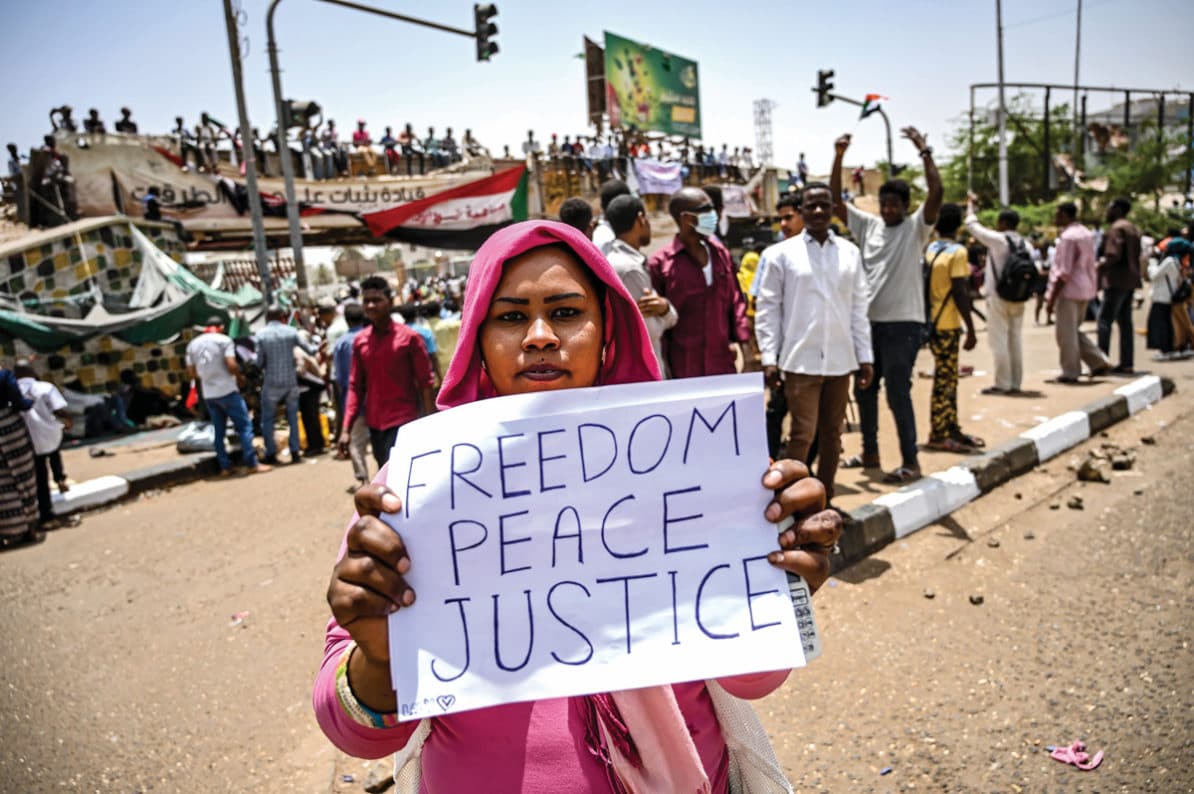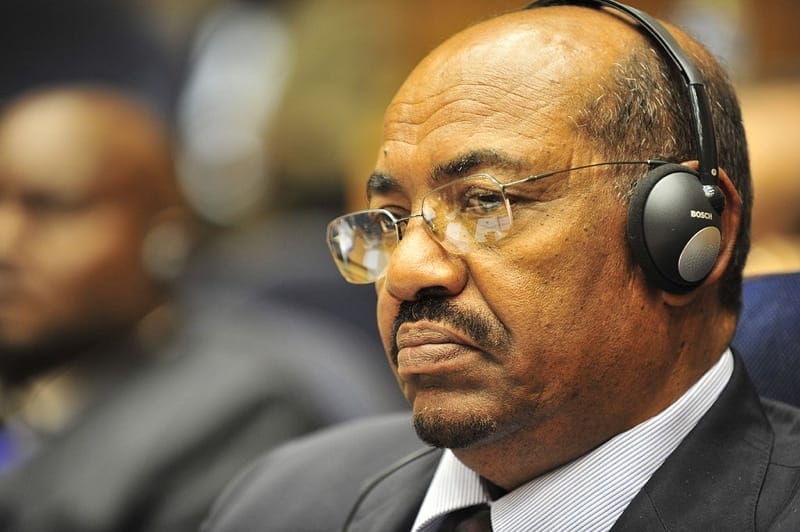Moment that mattered: Omar al-Bashir is ousted from power in Sudan
Amid popular protests and following a military coup, Sudan’s leader for three decades, Omar al-Bashir, was dramatically toppled from power on 11th April 2019. In DG #35 Nima Elbagir, senior international correspondent at CNN, gave us her first-hand insights into his regime’s brutal attempts to quell the demonstrations and the fragility of her country’s ongoing transition to democracy

A protester holds a placard in Khartoum, Sudan, on 18th April 2019 at a rally to mark a week since the ousting of Omar al-Bashir. Photo: Ozan Kose / AFP / Getty Images
11th April 2019 (Taken from: #35)
On 11th April, as Omar al-Bashir was being ousted from power in Sudan by a military coup, Nima Elbagir was too excited to sleep. She’d been receiving updates from her contacts in the country throughout the night and at a little after 4am she went live from the New York studios of CNN, the network she joined as a reporter in 2011, to break the news. The story was deeply personal to her; she was a child when al-Bashir seized control of her country and shattered her family life, but after 30 years of authoritarian rule and months of protests the dictator had been overthrown.
“At the heart of the demonstrations was this sense of the country becoming increasingly corrupt, stratified and militarised,” says Elbagir. “The level of corruption had become so insane and overt. People speak about the trigger [for the protests] being the rise in the cost of living and bread, but that does a disservice to what this was really about. It wasn’t a revolution of the hungry. It was a revolution of a people who had finally had enough.
“There was this extraordinary video from northern Sudan, where the demonstrations started [on 19th December 2018],” Elbagir continues. “Bashir’s convoy is going past the people in these gleaming 4x4s and this woman starts screaming. She’s so angry at the ostentation – and right there you can see the fear barrier breaking. This woman in national dress became an iconic image.”

Omar al-Bashir at a summit in Addis Ababa, Ethiopia, in January 2009. Photo: US Navy / Mass Communication Specialist 2nd Class Jesse B Awalt
Over the next few months, against a backdrop of an increasingly violent crackdown, the demonstrators established a base in the centre of the capital, Khartoum. “You had the children of prominent Islamists [from the regime and its supporters] joining,” Elbagir recalls. “The regime began to self-cannibalise because it’s difficult to open fire [on protesters] when they include the children of people who matter. Some intelligence officials told me that they would pick up kids, take them into their offices and then the kids’ fathers would start calling. These fathers were army and police chiefs and senior Islamist figures, and so the kids would be released back to the demonstration.”
On 22nd February, by which time 57 protesters had been killed by security forces, Bashir declared a state of emergency and replaced state governors with army generals. The principal group behind the protests, the Sudanese Professionals Association (SPA), vowed to continue, and the crackdown intensified. “When I was there in March, reporting on the demonstrations carried a death sentence,” says Elbagir. “We had to go undercover. We filmed on hidden cameras and mobile phones, and we were at one demonstration when it was suddenly overrun by police.”
In that CNN report, Elbagir can be seen hiding in a family home, peering through the narrow gaps in the curtains to watch the security services go door to door searching for protesters and using tear gas liberally. The team covertly filmed a neighbour being dragged off and beaten. Elbagir managed to run to safety, but she heard from some of the more than 3,000 protesters who weren’t so lucky: they spoke of beatings at ‘ghost houses’, the name given to the unmarked buildings throughout the country used by the al-Bashir regime to torture suspected opponents. Several protesters she spoke to were sent to the notorious al-Talaja (‘the refrigerator’) facility, at which detainees were tortured in sub-zero temperatures.
There were orders to ‘break the girls’, because ‘if you can break the girls you will break the men’”
Elbagir also reported on how the authorities used sexual violence against women as a strategy. “First it was harassment, then physical beatings and sexual threats, and then sexual assault and rapes,” she says. She asked her contacts with ties to Sudanese intelligence if women, who made up the majority of protesters, were intentionally being targeted. They told her that there were orders to “break the girls”, because “if you can break the girls you will break the men”.
The military’s arrest and overthrow of al-Bashir sparked a struggle for power: on one side the military junta, the Transitional Military Council (TMC), and on the other the protesters, who continued to occupy camps in the capital. “The end goal was not Bashir leaving power, it was civilian government,” says Elbagir. “The Sudanese knew that once they took ground they could not leave. So they stayed.” Officially the TMC was led by Lt-Gen Abdel Fattah Abdelrahman Burhan. But everyone in Sudan knew its deputy leader was its de facto head: Mohamed Hamdan Dagalo, widely known as Hemeti.
On 3rd June paramilitary forces stormed a protest camp in Khartoum, killing at least 128 people and wounding hundreds more. The SPA said that there were 70 reports of rape during the assault on the camp. Witnesses say that the paramilitaries threw the bodies of the murdered protesters in the River Nile.
My parents still live in Sudan, so it was terrifying”
“My parents still live in Sudan, so it was terrifying,” says Elbagir. “There was a communications blackout but I could sporadically get through to them on their landline. It was heartbreaking. I heard about bloated bodies bobbing along the Nile.”
The group implicated in the massacre was the Rapid Support Forces (RSF), a state-backed paramilitary organisation led by Hemeti, whose decision to turn against al-Bashir, a president his group used to support through intimidation and violence, was viewed as a major factor in the April coup. Elbagir was the first ever journalist to interview Hemeti, back in 2008 when he ran the ‘Janjaweed’ Arab militia, which was accused by Human Rights Watch of committing crimes against humanity during the Darfur War, a conflict over which the international criminal court charged al-Bashir with three counts of genocide.

Nima Elbagir, senior international correspondent for CNN
“I’ll never forget the experience of meeting him,” says Elbagir. “Hemeti was only in his early 30s, running this paramilitary and behaving like a tribal leader,” she recalls. “He had this moss-green army coat that he wore hanging off his shoulders like a cloak, and there was this great tent they unpacked and packed up for him where he had sultanas in crystal bowls – and this was in the deserts of Darfur. I always felt that he was one of the most ambitious people I’ve ever met.”
Hemeti denies that he ordered the 3rd June killings. “We can’t prove that he ordered the killings,” says Elbagir, “but this is a militia that he previously tasked with ethnic cleansing. Does he expect them to be disciplined? He admits, and the government admits, that the militia were told to clear the protest site.”
Yet out of the bloodshed and chaos emerged hope. On 17th August the ruling military council and leaders from an umbrella group of protesters signed a power-sharing accord, which paves the way for a transitional government and elections in just over three years’ time. A military leader will head the government for the first 21 months, and a civilian leader for the following 18 months. Hemeti, who Elbagir says is now the most powerful person in the country, was one of the main signatories.
It may seem strange that the protesters were prepared to sign an accord with a man they believe ordered a massacre against them only weeks earlier, but Elbagir believes they achieved significant concessions from the military and acted pragmatically. “I think the accord is the best they could have done,” she says.
The sophistication and perseverance of the demonstrators has been inspiring to watch”
On 19th August 2019 al-Bashir appeared in a Khartoum court where he was accused of corruption. A detective told the court that al-Bashir had received $90 million from Saudi Arabia, a key backer until the coup, for his personal use. Elbagir spoke to her producer in Sudan straight after the first day of the trial. “When he came out and called me his voice was shaky,” Elbagir says. “He said: ‘Nima, at the moment when they said to him, “State your name,” like he was any other criminal, and he said, “Omar Hassan al-Bashir,” and they said, “Your profession?” and he said, “Former leader of Sudan,” it was like a sonic wave rolled through the courthouse while everybody absorbed what this meant.’” After 30 years of terrorising his people, al-Bashir was in a cage.
But will it satisfy the protesters? “People are going to be watching closely to see whether he goes to trial for the deaths of protesters,” says Elbagir. “Because that charge carries the death sentence. In that case the families of victims could accept blood money instead of him being executed, but every single mother or father of a victim we spoke to said they want to see al-Bashir executed.”
Elbagir is hopeful that she will get to vote in her home country in 2022. “The level of sophistication and perseverance of the demonstrators has been inspiring to watch,” she says. “Sudan first has to survive 21 months in which the head of the sovereign council is from the military. And for the next three years and three months, people who have had a very limited experience of democracy need to be educated about voting along political and moral lines rather than tribal ones. But there is reason for optimism.”
Update
On 14th December 2019, Omar al-Bashir was convicted by a court in Khartoum of money laundering and corruption, and sentenced to two years in prison. Two months into that sentence, on 11th February 2020, Sudan’s authorities announced that the former president would be handed over to the International Criminal Court to face charges of genocide and war crimes in the Hague. The charges of crimes against humanity relate to Bashir’s role in the Darfur conflict from 2003 onwards, where the Sudanese government’s support for a policy of ethnic cleansing targeting the region’s non-Arab population is thought to have led to the deaths of 300,000 people.
Slow Journalism in your inbox, plus infographics, offers and more: sign up for the free DG newsletter. Sign me up
Thanks for signing up.








